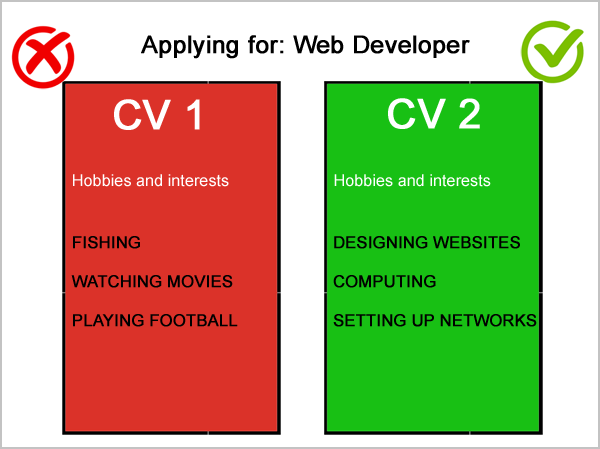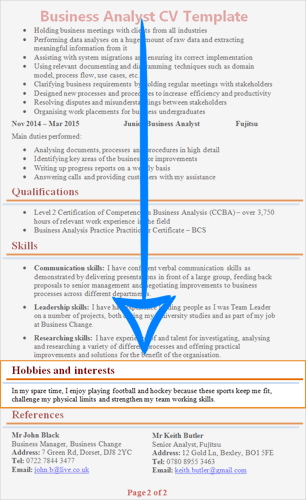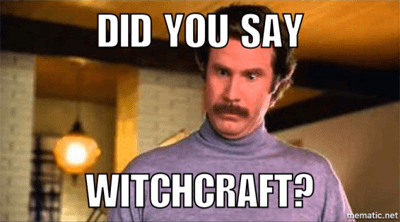Examples of Hobbies and Interests to put on a CV
The hobbies and interests section is an important but optional section in your CV. Many candidates do include it in their CVs, whereas others don’t.
We recommend including your personal interests on your CV because it is a great way to stand out from the crowd, show the prospective employer a bit of your personality and make it a basis for conversion at the job interview.
David Littleford et al., (2004) in their book Career Skills (pg. 14-15) mention under “other interests”:
“You should include hobbies and other interests, especially if they involve social and community activities. These activities are important – cover membership of societies, sports clubs/teams, etc. All these activities and the extent of your involvement give the recruiter clues about the real you and your interests.”
In this guide you will find out:
- What hobbies and interests are;
- The benefits of writing your personal interests on your CV, and;
- Examples of many hobbies + how to add them to your CV.

1. What are hobbies and interests?
A hobby is an activity that you regularly pursue for enjoyment purposes, particularly during your leisure time. These are activities that generally relieve you from stress, tension or fatigue.
What are examples of hobbies for a CV?
- Playing sports (football, tennis, etc.)
- Playing chess and solving puzzle games
- Reading and writing books and articles
- Drawing, sketching and painting
- Cooking and baking
- Travelling
An interest is an activity that you want to do or are currently doing on an irregular basis.
What are examples of personal interests for a CV?
- Organising events in the community
- Being involved with charities
- Volunteering at local companies, clubs and organisations
- Participating in fundraising events
- Participating in campaigns
- Joining social, environmental or animal rights groups
2. Should I add hobbies and interests to my CV?
Yes, adding personal hobbies to your CV can strengthen your job application and increase the chances of securing a job interview. This is because recruiters invest in people; they hire and work with human beings, not robots. Recruiters actively look for every clue in the candidates’ CVs to find out about their interests, skills and competencies.
The benefits of including your personal interests on your CV:
- It will give the recruiter a fuller and more complete picture of you
- Extracurricular interests tell the employer that you are an all-rounded person who, besides just working, also enjoys having a good time
- They form a great basis for discussion at the interview stage
- Sporting activities indicate that you are fit, healthy and outgoing
- Involvement in the community suggests good interpersonal skills
- School leavers
- College and university students
- Candidates with little or no work experience
- Candidates who have blank space in their CVs
Remember that your CV is your personal marketing tool, and you should make the most out of using the totality of your CV, including the interests section, to “sell yourself” to the prospective employer.
- Senior professionals including managers and executives
- Candidates with a lot of work experience
- Candidates whose CVs are overflowing to more than 2 A4 pages
Due to the lack of valuable space on these candidates’ CVs, relevant work experience and qualifications take a higher priority over personal interests.
3. What your hobbies “say” about you
‘Playing football’, ‘solving puzzles’, and ‘fixing computers’ are not generic terms without any meaning, rather; they carry a deeper message.
Here’s what the prospective employers will be subconsciously asking themselves when reading through the candidates’ CVs:
What does “I play football on a regular basis”, “I enjoy solving puzzles” or “I like fixing computers” tell me about this candidate?
Many people do not realise that the hobbies and interests they include in their CVs can reveal a lot of information about them and their personalities.
Below is a list of some hobbies and interests and what they tell employers about the candidate:
List of hobbies and interests for a CV
| Hobby, interest or skill | What it reveals about the candidate |
|---|---|
| Computing | Is technical-minded and good with technology, may also be introverted |
| Swimming | Keeps fit and healthy |
| Solving puzzles | Has excellent problem-solving and analytical skills and likes to overcome challenges |
| Playing Football/Soccer | Has team-working skills; enjoys the company of other people |
| Playing chess | Is intelligent, a strategist and deliberates before taking action |
| Mentoring | Is a team player (rather than loner), has good communication and interpersonal skills |
| Playing squash | Is highly competitive and motivated |
| Reading | Is intelligent, likes learning new things, is open-minded and analytical |
| Writing | Is creative, artistic and/or passionate |
| Going to the gym | Is conscious of their health, is fit and motivated to accomplish goals |
| Travelling | Is outgoing, social and adventurous |
Ask yourself: how do these interests add value to my application? Try to highlight your ability to interact, help and/or communicate with others.
4. What kind of hobbies should I put on my CV?
Answer: Those that are relevant and add value to your application!
The rule of thumb is only to include activities that contribute to and strengthen the application. If you cannot draw this valid connection, then do not include those activities.
- Bain activities(such as playing chess) are a good match for jobs which are technical or analytical in nature (e.g. jobs in IT or Science).
- Team sports(such as playing football) are a good match for jobs which require working with people on a daily basis (e.g. jobs in Business or Marketing).

Different activities can be interpreted differently depending on the job you are applying for. For example, “playing computer games” as a hobby is irrelevant to most jobs and may sometimes portray you as a self-absorbed individual living in their own little cyber world.
However, the same hobby can add tremendous weight to your CV if you apply for a job as a video game developer, graphics designer or as a shop assistant at your local games shop!
How to match your interests with the job you are applying for:
- Check out the job specification and look for clues.
For example, if the job holder “must have excellent people skills”, you could mention your volunteering, team sports or socialising activities – all of which develop your communication, interpersonal and people skills. Don’t mention playing chess or jogging as that would be irrelevant.
If, on the other hand, the job specification states that the person “must possess outstanding technical skills”, you would mention playing chess, building computers and upgrading computer networks – things that indicate that you are technically-competent and analytical minded. Don’t mention socialising events because that would be less relevant.
- Researching the company’s culture.
Many companies have a ‘culture’ in the way they operated and how employees of that organisation behave. Google, for instance, is now famously known for allowing employees to play games, take a walk or do sports in order to relieve stress or become more productive during working hours. When applying for a job at a company like Google, there is no harm in showing a little bit of your fun, playful and human side because that fits in nicely with their company culture.
- Make a list of your skills and abilities
It is always a good idea to write down the list of skills and abilities that you possess and see which of these would add value if you include it in your CV. Skills and abilities are closely related to your hobbies and interest; therefore, you may include them in this section too.
5. How to write hobbies on a CV
Now, let’s get down to writing it.
There are thousands of hobbies and interests that people include in their CVs. Selecting the correct hobbies to include will depend on a number of factors, including the job sector and the job role/specifications.
- Choose hobbies that are relevant to the job
- 1-2 related personal interests would be ideal
- Choose a variety of hobbies to show that you are an all-rounded person
Some additional guidelines for writing your CV interests section:- Keep it short and to the point (one paragraph; maximum 2-3 lines)
- Be specific (e.g. instead of “I enjoy reading”, write “I enjoy reading non-fiction and current affairs books.”)
- Don’t list down your interest – describe them in sentences!
- Keep it real and don’t exaggerate
6. What are some good hobbies to put on a CV? [Examples]
Let’s get down to the specifics!
Martin Yate, a best-selling careers author, outlines three broad categories of leisure activities to include on your CV in his book The Ultimate CV Book (Pg.35):
- Team sports (football, cricket, basketball, etc.)
- Determination activities (running, swimming, cycling, climbing, etc.)
- Brain activities (chess, reading, etc.)
However, not every one of the above categories may be suitable for your situation and the job that you are applying for. Only select the hobbies and interests that are relevant to the job and add value to your application.
Below you will find lists of good hobbies/interests to put on your CV:
10 Examples of good interests for a CV
- Involved in local clubs, classes and groups
- Organising events in the community
- Being involved with charities
- Volunteering at local companies, clubs and organisations
- Attending events, shows and exhibitions
- Participating in fundraising events
- Maintaining a personal blog
- Being a member of social, environmental or animal rights groups
- Participating in campaigns
- Preparing food for events
These interests enhance your CV because they inform the employer that you possess excellent interpersonal, organisational and communication skills which enables you to undertake these activities. It also confirms that you are motivated and determined about the things you are passionate about.
27 Examples of excellent hobbies to put on a CV
- Following business and financial news
- Reading business and financial magazines
- Being a member of a professional body
- Playing chess and puzzle games
- Playing individual sports (running, swimming, cycling, etc.)
- Playing team sports (football, cricket, basketball, tennis, etc.)
- Mentoring or coaching
- Building and fixing computers
- Designing and development websites
- Setting-up computer networks
- Playing chess and puzzle games
- Keeping up with the latest developments in technology
- Designing art
- Drawing, sketching, painting, etc. by hand
- Using computer programs to design
- Completing DIY projects
- Photography
- Playing music
- Cooking and baking
- Going out and eating at restaurants
- Creating new dishes
- Watching Food Channel or other food-related TV programmes (e.g. MasterChef)
- Reading (fiction and non-fiction books, magazines, etc.)
- Writing (blog posts, articles, poems, books, etc.)
- Learning a new skill
- Fishing
- Travelling
7. 5 Great examples of interests section of a CV
Example 1 – Economist
In my spare time, I enjoy meeting up with my friends and family, and I currently volunteer as a guest columnist for my local paper, The Daily Herald. I also enjoy reading business and economics magazines such as the Economist and Financial Times. [Economist CV template]Example 2 – Teaching Assistant
Note: The example below is a bit long because the candidate had empty space in their CV and utilised it accordingly.

Example 3 – Civil Engineer
Due to my enduring passion for engineering, I enjoy building upon my knowledge of various computer programs that I can utilise to further my career in the industry. I also enjoy playing a number of sports, including tennis and indoor hockey. [Civil engineer CV template]Example 4 – Credit Controller

Example 5 – Journalist
In my spare time, I enjoy going to the gym and regularly partake in charity runs around the UK in order to help the community and to stay fit and healthy. I also enjoy keeping up to date with the current affairs, both national and international events, which helps me to get inspiration for the stories that I produce when I am working.8. Location of the hobbies section on a CV
The interests section should be placed at the end of the second page, just before the CV references section:

Remember: This section is optional so placing it higher up on your CV will give the prospective employer the impression that you do not understand how to prioritise things. Think about it, how can your personal interests be more important to the employer than you work experience or qualifications?
9. Things to avoid when writing your hobbies section
Avoid falling victim to stereotypesIt is best to avoid putting anything controversial or sensitive on your CV. Humans are by their nature very judgemental, so be wise about what you disclose on your CV. For example, some recruiters may judge you negatively if you included heavy metal as your favourite music genre.
Keep clear of exposing your political, religious or sporting affiliationsStating that you are an “active member of the local church” may harm your chances of being invited to an interview, especially when the potential employer reading your CV is a strict atheist. Similarly, stating that you “volunteered on a number of Labour election campaigns” or that you are a “huge fan of Manchester United” is also not a very good idea.
Avoid mentioning risky or time-consuming hobbiesIt is in the employer’s best interest to have you healthy, fit and able to work. Any leisure activities that put your life at risk (or are too time-consuming) will be looked unfavourably upon. Therefore, please remove “regular rock climbing in the Himalayas” as one of your hobbies from your CV. Thanks.
Irrelevant hobbiesOnly make mention of your personal interests if they add value to your application. What value does “Stamp and coin collecting” as a hobby to the application of someone who applies for the Logistics Engineering Manager position? The answer: none. However, stamp collecting would be a very valuable hobby to mention when applying for a job as a Stamp Appraiser.
Senior-level CVsManagers, executives and directors should entirely omit this section of their CVs. Their personal interests should be clear from their achievements and experiences in the workforce.
Including too many hobbiesAdding too many hobbies to your CV fills up valuable space that could be used for more important information. The following is a sample of a CV’s Hobbies section with too many hobbies:

At this stage, the prospective employer will most likely be wondering: “Gosh, when will this person have any time to do some work?!”
LyingRemember that whatever you put on your CV, including your personal interests, may be asked about and scrutinised at the interview stage. Save yourself the embarrassment and do not lie about your hobbies.
Weird interestsPerforming witchcraft and frog dissections for fun shouldn’t be the hobbies of anyone, let alone mentioning it on your professional CV!

Yes, believe it or not, people have actually used these hobbies on their CVs…
Conclusion
Adding a list of hobbies and interests to your CV is an excellent way of enhancing your CV and improving the chances of being invited to job interviews. Regardless of your job or industry, you should only add hobbies or interests on your CV that are relevant and add value to your application.
Good example list of personal interests and hobbies for a CV that will impress any employer:
- Team sports (e.g. football, basketball, tennis, etc.)
- Solo sports (swimming, walking, jogging, etc.)
- Designing, drawing, and painting
- Building things (computers, product prototypes, etc.)
- Coaching and mentoring
- Volunteering and participating in the community
- Organising events or activities
- Attending social or business events
- Reading and writing
- Learning a new skill
- Solving puzzles
That is it; we have come to the end of this guide. You should now have written an excellent CV hobbies and interests section – well done!
- Check out the job specification and look for clues.
CR :: https://www.cvplaza.com/



No comments:
Post a Comment